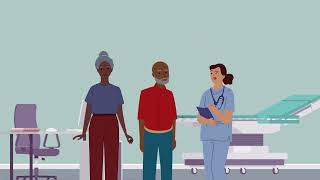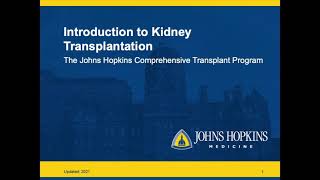The Johns Hopkins Kidney Transplant Program provides comprehensive kidney treatment for all patients. Our research has led to breakthrough innovations for those suffering with renal failure.
-
Frequently Asked Questions
Learn what to expect during the kidney donation process.

-
Kidney Programs
Explore some of our advanced kidney transplant programs, providing patients with more options for care.

-
Contact Us
Contact us for more information about our kidney transplant programs.

Kidney Transplantation | The Evaluation Process
Learn about the kidney transplant evaluation process, from the first clinic visit to the decision about waitlisting. Understand who is on the transplant team and information they use to determine if transplant is the best option.
This video is also available in Spanish.
Kidney Transplant | Antara's Story
Years after cancer treatment and a combined heart/lung transplant, Antara Desai's kidneys began to fail. In need of a kidney transplant, Antara turned to Johns Hopkins, where a multidisciplinary team of experts developed a treatment plan with her complex medical history in mind.
Learn more about our living donor programFrequently Asked Questions
-
There are several situations where a kidney transplant may be considered a viable option. These include, but are not limited to, the following:
- Diabetes
- adult onset, or type 2
- juvenile diabetes, or type 1
- Hypertension/high blood pressure
- Congenital renal obstructive disorders leading to hydronephrosis, including the following:
- Ureteropelvic junction obstruction
- Vesicoureteral reflux
- Posterior urethral valves
- Prune belly syndrome
- Megaureter
- Congenital nephrotic syndrome
- Alport syndrome
- Nephropathic and juvenile cystinosis
- Polycystic kidney disease
- Nail-patella syndrome
- Glomerulonephritis
- Berger disease
- Henoch-Schönlein purpura
- Hemolytic uremic syndrome
- Wegener granulomatosis
- Goodpasture syndrome
- Diabetes
-

You must go through several medical tests before eligibility is determined. You will meet with a team of physicians, surgeons and specialists. The evaluation time takes approximately one to two months.
You will need to go through a referral process. Read the frequently asked questions about kidney transplant referrals. -

Sometimes, a patient may need a kidney/pancreas transplant. While a patient who requires a pancreas transplant will most likely need a kidney transplant, a patient who needs a kidney transplant may not necessarily require a .
-
Yes. The Johns Hopkins Comprehensive Transplant Center offers several different options for kidney transplant, including living donation. Your physician and surgeons will work with you to determine your best option:
- Traditional Donation:
- Traditional kidney transplants occur when a patient receives a kidney from a deceased donor. This organ is referred to as a cadaveric kidney.
- Living Donor Transplant:
- When a patient has a family member or friend who is willing to donate a kidney, this is called a living donor transplant.
- Incompatible Kidney Transplant:
- More than one-third of willing donors are turned down because their blood types are not compatible with the person to whom they wish to donate their kidney. The Johns Hopkins Comprehensive Transplant Center developed methods to make a donated kidney more compatible. Our Incompatible Kidney Transplant Program (InKTP), founded in 1998, is a world leader in this kind of transplant, and has shown dramatic outcomes.
- Kidney Swap / Exchange:
- At Johns Hopkins, we also participate in kidney swaps and exchanges, where donor/recipient pairs will trade organs. For example, if Donor A was unable to donate to Recipient A, he could donate to Recipient B. Recipient B’s donor would then donate to Patient A. This is a very effective way of managing incompatible donors and recipients.
- Non-Directed (Altruistic) Donor:
- The Johns Hopkins Comprehensive Transplant Center encourages people to consider becoming a non-directed kidney donor. These donors do not know the recipient, and are donating to improve the health of an unknown individual. Non-directed donations can set off a domino of kidney donations, which can have an effect on many people. One of the largest kidney exchanges that was started by a non-directed donor resulted in fourteen transplantations.
- Traditional Donation:
Johns Hopkins Introduction to Kidney Transplantation
Learn more information about the Johns Hopkins Kidney Transplant Program as we answer frequently asked questions and explain the process of receiving a kidney transplant
Kidney Transplant Programs
-
Living Donors
Our living kidney donation program drastically improves the quality of life for recipients.
-
Incompatible Kidney Transplant Program
This program helps find a match for incompatible donor and patient pairs.





